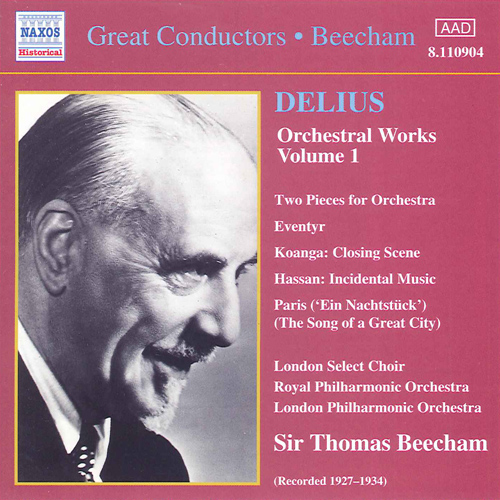Not available in the United States due to possible copyright restrictions
DELIUS, F.: Orchestral Works, Vol. 1 (Beecham) (1927-1934)
One of the finest orchestras on the international stage, the London Philharmonic Orchestra was founded in 1932 by Sir Thomas Beecham. Subsequent principal conductors have included Sir Adrian Boult, Bernard Haitink, Sir Georg Solti, Klaus Tennstedt and Kurt Masur. In 2007 Vladimir Jurowski became the orchestra’s current principal conductor.
The London Philharmonic Orchestra has been performing at Southbank Centre’s Royal Festival Hall since it opened in 1951, becoming resident orchestra in 1992. Each summer it plays for Glyndebourne Festival Opera, where it has been resident symphony orchestra for over 50 years. It also performs regularly around the UK and frequently tours abroad.
The orchestra broadcasts regularly on television and radio, and has recorded soundtracks for numerous films including The Lord of the Rings. In summer 2012 the orchestra was chosen to record all the world’s national anthems for the London 2012 Olympics. In 2005 it began releasing live, studio and archive recordings on its own CD label.


Born in 1862 in Bradford of German parentage, Frederick Delius was sent by his father to Florida to be an orange grower. There he developed further his earlier musical interests and eventually persuaded his father to support him during a period of musical study at the Leipzig Conservatory, where he met Grieg. With continued paternal support he moved thereafter to Paris and in 1897 settled at Grez-sur-Loing with the painter Jelka Rosen, who later became his wife. His final years brought blindness and paralysis, the result of an early syphilitic infection, and his later music was dictated to the young English musician Eric Fenby, who became his amanuensis. Delius had a strong champion in the conductor Sir Thomas Beecham, who did much to bring his music before the British public. The musical language of Delius, with a characteristic harmony and lyricism of its own, often has a rhapsodic intensity of feeling.
Stage Works
The stage works of Delius include the lyric drama Koanga, a love story set on a Mississippi plantation, where the heroine, the slave girl Palmyra, rejects the advances of the overseer in favour of a prince of her own tribe, Koanga. La Calinda, from this opera, is a well-known orchestral excerpt. The opera A Village Romeo and Juliet, based on a novel by Gottfried Keller, is generally known to concert audiences because of the familiar orchestral interlude ‘The Walk to the Paradise Garden’, which is played as the lovers walk together to a village inn. From the later opera Fennimore and Gerda comes an orchestral Intermezzo, arranged after the death of the composer by Eric Fenby. The opera Irmelin, first performed under Beecham only in 1953, offers an orchestral prelude for concert repertoire. Incidental music for James Elroy Flecker’s Hassan has again provided items for concert repertoire.
Orchestral Music
Popular orchestral works by Delius must include Brigg Fair: An English Rhapsody and the rhapsody In a Summer Garden. On Hearing the First Cuckoo in Spring and Summer Night on the River constitute two pieces for small orchestra, with a further work, A Song Before Sunrise, composed for similar forces. Légende, for violin and orchestra, is a useful work for violinists, and it may also be heard in a violin and piano version. A rhapsodic violin concerto, a cello concerto, and a double concerto for both instruments together are nowadays heard rather less frequently.
Choral and Orchestral Music
Music by Delius for singers and orchestra includes Appalachia, his variations on a traditional plantation song, and his Walt Whitman settings Sea Drift and Songs of Farewell. The remarkable A Mass of Life, based on Nietzsche, expresses the composer’s own creed.
Chamber Music
Delius wrote three numbered violin sonatas, the third first performed and recorded by the violinist May Harrison with the composer Arnold Bax as pianist. The cellist Beatrice Harrison gave the first performance of Delius’s Cello Sonata, accompanied by the composer Hamilton Harty.
































